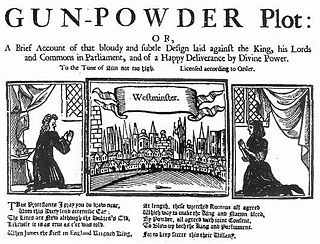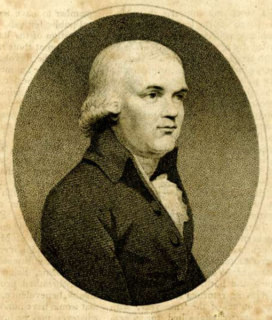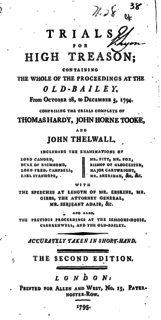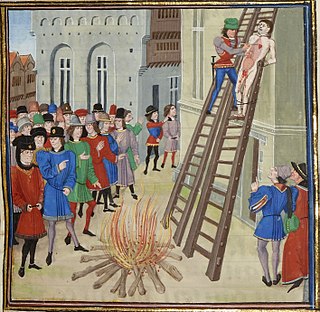
The Gunpowder Plot of 1605, in earlier centuries often called the Gunpowder Treason Plot or the Jesuit Treason, was a failed assassination attempt against King James I by a group of provincial English Catholics led by Robert Catesby who sought to restore the Catholic monarchy to England after decades of persecution against Catholics.

The Committee of Public Safety formed the provisional government in France, led mainly by Maximilien Robespierre, during the Reign of Terror (1793–1794), a phase of the French Revolution. Supplementing the Committee of General Defence created after the execution of King Louis XVI in January 1793, the Committee of Public Safety was created in April 1793 by the National Convention and restructured in July 1793. It was charged with protecting the new republic against its foreign and domestic enemies, fighting the First Coalition and the Vendée revolt. As a wartime measure, the committee was given broad supervisory and administrative powers over the armed forces, judiciary and legislature, as well as the executive bodies and ministers of the Convention.

The London Corresponding Society (LCS) was a federation of local reading and debating clubs that in the decade following the French Revolution agitated for the democratic reform of the British Parliament. In contrast to other reform associations of the period, it drew largely upon working men and was itself organised on a formal democratic basis.
The Society of the Friends of the People was an organisation in Great Britain that was focused on advocating for Parliamentary Reform. It was founded by the Whig Party in 1792.
Francis Tresham, eldest son of Thomas Tresham and Muriel Throckmorton, was a member of the group of English provincial Catholics who planned the failed Gunpowder Plot of 1605, a conspiracy to assassinate King James I of England.

Jeremiah Joyce (1763–1816) was an English Unitarian minister and writer. He achieved notoriety as one of the group of political activists arrested in May 1794.

Thomas Hardy was a British shoemaker who was an early Radical, and the founder, first Secretary, and Treasurer of the London Corresponding Society.

William Wickham was a British civil servant and politician who was a founder of British foreign secret service activities during the French Revolution, and was later a Privy Counsellor and Chief Secretary for Ireland. He ended his career in government service in 1804, resigning his post in Ireland where, privately, he denounced government policy as "unjust" and "oppressive".

Thomas Spence was an English Radical and advocate of the common ownership of land and a democratic equality of the sexes. Spence was one of the leading revolutionaries of the late 18th and early 19th centuries. He was born in poverty and died the same way, after long periods of imprisonment, in 1814.

Edward Marcus Despard, an Irish officer in the service of the British Crown, gained notoriety as a colonial administrator for refusing to recognise racial distinctions in law and, following his recall to London, as a republican conspirator. Despard's associations with the London Corresponding Society, the United Irishmen and United Britons led to his trial and execution in 1803 as the alleged ringleader of a plot to assassinate the King.

John Thelwall was a radical British orator, writer, political reformer, journalist, poet, elocutionist and speech therapist.

The 1794 Treason Trials, arranged by the administration of William Pitt, were intended to cripple the British radical movement of the 1790s. Over thirty radicals were arrested; three were tried for high treason: Thomas Hardy, John Horne Tooke and John Thelwall. In a repudiation of the government's policies, they were acquitted by three separate juries in November 1794 to public rejoicing. The treason trials were an extension of the sedition trials of 1792 and 1793 against parliamentary reformers in both England and Scotland.

To be hanged, drawn and quartered became a statutory penalty for men convicted of high treason in the Kingdom of England from 1352, although similar rituals are recorded during the reign of King Henry III (1216–1272). The convicted traitor was fastened to a hurdle, or wooden panel, and drawn by horse to the place of execution, where he was then hanged, emasculated, disembowelled, beheaded, and quartered. His remains would then often be displayed in prominent places across the country, such as London Bridge, to serve as a warning of the fate of traitors. For reasons of public decency, women convicted of high treason were instead burned at the stake.

William Skirving was one of the five Scottish Martyrs for Liberty. Active in the cause of universal franchise and other reforms inspired by the French Revolution, they were convicted of sedition in 1793–94, and sentenced to transportation to New South Wales.
The Habeas Corpus Suspension Act 1794 was an Act passed by the British Parliament. The Act's long title was An act to empower his Majesty to secure and detain such persons as his Majesty shall suspect are conspiring against his person and government.

The Despard Plot was a failed 1802 conspiracy by British revolutionaries led by Colonel Edward Marcus Despard, a former army officer and colonial official. Evidence presented in court suggested that Despard planned to assassinate the monarch George III and seize key strong points in London such as the Bank of England and Tower of London as a prelude to a wider uprising by the population of the city. The British Government was aware of the plot five months before the scheduled date of attack, but waited to arrest to gain enough evidence. One week before the scheduled attack, Despard and his co-conspirators were arrested at the Oakley Arms pub in Lambeth on suspicion of plotting an uprising. Despard's execution on 21 February 1803 was attended by a crowd of around 20,000, the largest public gathering until the funeral of Lord Nelson two years later following the Battle of Trafalgar.

The 1696 Jacobite assassination plot was an unsuccessful attempt led by George Barclay to ambush and kill William III and II of England, Scotland and Ireland in early 1696.
Felix Vaughan was an English barrister, known for his role as defence counsel in the treason trials of the 1790s.

Thomas Walker (1749–1817) was an English cotton merchant and political radical.
John Baxter (1756-1845?), was a radical British writer and silversmith, living in St Leonards parish, Shoreditch during the 1790s and until at least 1817. He is noteworthy as chairman of the London Corresponding Society in 1794 and as one of the twelve indicted during the 1794 Treason Trials. He also compiled and published ‘’A new and impartial history of England’’ in 1796.















